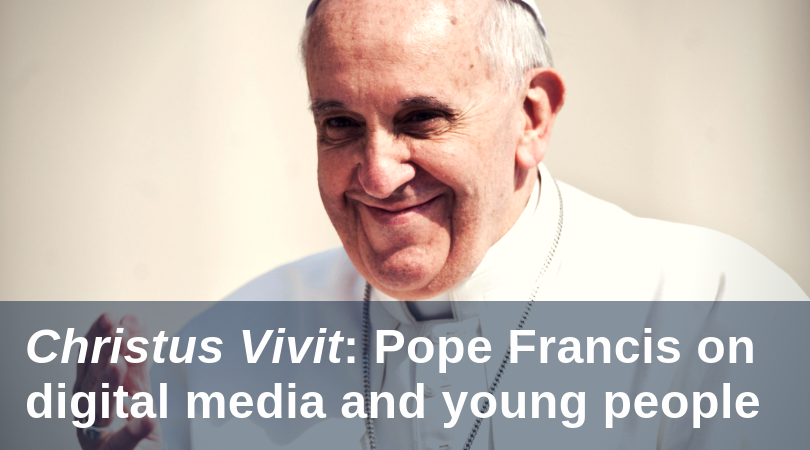
Pope Francis has once again expressed a set of prayer-provoking insights about our use of contemporary media and Catholic stewardship of the “Good News” amid a changing information culture that distorts human community. His sweeping new reflections expand on a crucial theme, echoing the World Communications Day message for 2019 and other documents: pastoral concern about online networks’ pitfalls, alongside their potential—and their need—for evangelization.
Christus Vivit (“Christ is Alive!”), the pope’s Apostolic Exhortation on Young People, the Faith and Vocational Discernment, includes a section analyzing “the digital environment” that endangers society in ways we need to take more seriously. This wake-up call about today’s news-sharing tools intensifies the responsibility Catholics and all advocates of the common good should feel toward the hearts and minds of so-called digital natives.
The diagnosis of high-tech toxicity is one of many topics in the Exhortation, released on March 25, 2019, the Feast of the Annunciation. That day honors the Archangel Gabriel’s announcement of news to bless Mary and change the future of the world.
Here are several of the memorable quotes and terms punctuating the document with guidance for renewing communication to help heal social polarization through a charitable embrace of truthfulness.
On the wide-reaching effect of digitalization
“It is no longer merely a question of ‘using’ instruments of communication, but of living in a highly digitalized culture that has had a profound impact on ideas of time and space, on our self-understanding, our understanding of others and the world, and our ability to communicate, learn, be informed and enter into relationship with others” (CV, 86).
Pope Francis warns the short-attention-span approach that “privileges images over listening and reading” can damage our “critical sense."
On social and political engagement
“The web and social networks … provide an extraordinary opportunity for dialogue, encounter and exchange between persons, as well as access to information and knowledge” (CV, 87).
Here, the pontiff is upbeat, appreciating technological incentives for “social and political engagement and active citizenship”; these encourage young people to stand up for the rights of the vulnerable. But he cautions that this new “public square” is not open equally to all citizens around the world.
On unhealthy interpersonal relationships
“It is not healthy to confuse communication with mere virtual contact. Indeed, the digital environment is also one of loneliness, manipulation, exploitation and violence, even to the extreme case of the ‘dark web’” (CV, 88).
Cyberbullying, pornography and various avenues for exploiting people reflect the non-incarnational character of online connections, “blocking the development of authentic interpersonal relationships.” This adds to risks of addictions, isolation and “a gradual loss of contact with concrete reality.”
An environment of remoteness “creates a delusional parallel reality that ignores human dignity” and invites a “digital migration” into a lonely world of rootlessness and “self-invention.” Young people “must find ways to pass from virtual contact to good and healthy communication" (CV, 90).
On the power of digital media interests
“It should not be forgotten that there are huge economic interests operating in the digital world, capable of exercising forms of control as subtle as they are invasive, creating mechanisms for the manipulation of consciences and of the democratic process” (CV, 89).
Various social media tend to favor conversations only among those who think alike, discouraging debate and creating “closed circuits” that can incubate prejudice and hate. “Fake news,” about which Pope Francis has written before, reveals “a culture that has lost its sense of truth and bends the facts to suit particular interests.” Individuals’ reputations are subjected to “summary trials” online—a phenomenon from which “the Church and her pastors are not exempt.”
Rushes to judgment in general, fed by our own impatience as avid-yet-unquestioning news consumers and conveyors, do not serve the causes of mercy, justice and accompaniment Pope Francis consistently highlights.
A follow-up post tomorrow on Christus Vivit will explore accompaniment as we can implement it in our parishes and communities. “The heart of information is people,” Pope Francis said in his 2018 message for World Communications Day.
Photo credit: Catholic Church England and Wales, Flickr, some rights reserved


